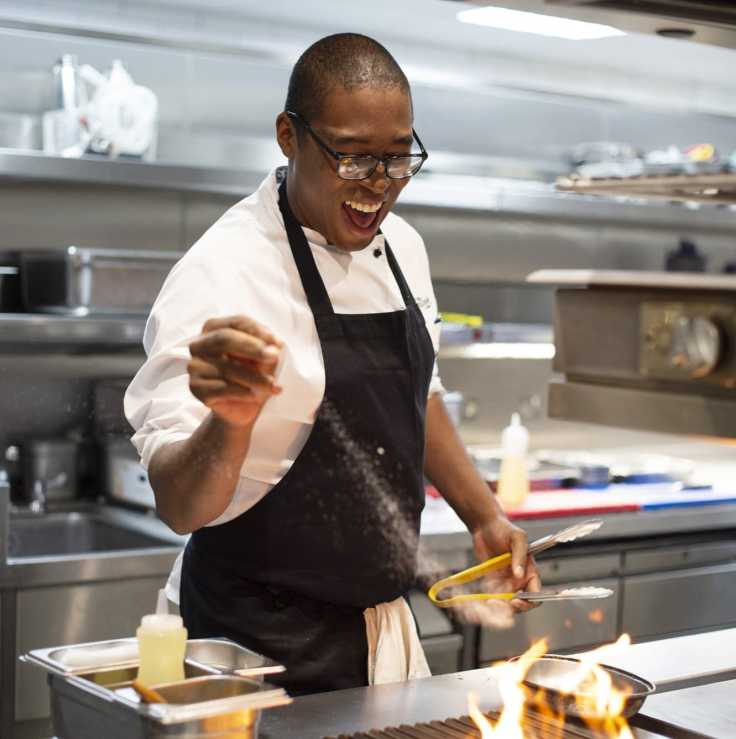Hospitality in Crisis: Are there enough chefs to keep up with London's insatiable demand for fine dining?
Chefs have not returned to work in the same numbers post-pandemic, leaving the hospitality industry grappling with an acute staffing crisis at a time when operators are also struggling with the soaring costs of doing business.
"Due to COVID-19, only one person can cry in the freezer at a time. Thank you, Management," read the printed page affixed to the steel door of the walk-in freezer. It was a meme I found and shared on Instagram, but one that was quickly appreciated and re-shared by former colleagues from my years working as a chef - for it touched, albeit humorously, on the high-stress reality of most commercial kitchen environments.
The announcement that esteemed Copenhagen culinary establishment Noma will close its doors at the end of 2024 has sent shockwaves through the food industry. Alongside the admiration and sadness expressed by industry peers and foodie fans alike, many questions are being asked about what Noma's chef-patron Rene Redzepe has himself called an "unsustainable" situation. There are allegations regarding working conditions - in particular, controversy surrounding its 30-odd interns who, until October 2022, were unpaid. The move added USD 50,000 to Noma's monthly bill, according to an article in the New York Times.
Noma is not the first fine dining establishment to come under scrutiny recently. As variously reported in the US, Blue Hill Farm and Eleven Madison Park are two examples of high-end restaurants coming under fire for questionable treatment of staff; but the announcement of Noma's impending closure may indicate the scale of the problem - one that is being felt around the globe, including in the UK.
Where are the capital's chefs?
Although it is one of the biggest contributors to the UK economy, representing 7.1% of UK employment pre-pandemic, in March 2020, fast forward almost two years later, and businesses are finding it hard to recruit and retain staff.
Many are asking whether the closure of Noma is the death knell of fine dining. Even without such drastic pronouncements, it is clear that fine dining, and in fact the hospitality industry in general, faces a challenge; not just in Denmark, but globally. According to the Financial Times, between February and April 2022, the UK's Office for National Statistics recorded 171,000 vacancies in accommodation and food service, an increase of 297 per cent from the previous year. Part of this high vacancy rate was down to workers not returning to jobs furloughed and workers having moved away during the pandemic and not returning.
According to a UK Parliamentary report, post-pandemic, from January-March 2020 to October-December 2021, the number of workers in the sector fell by 90,000 or 3.6%. This compared to a 1.3% decline in jobs across all industries over this period.
Covid Helped Chefs Discover Their Worth
I set out to explore the current challenges facing London's hospitality sector, which was hit hard by the pandemic; so much so that it inspired Rishi Sunak, then Chancellor of the Exchequer, to offer specific help to the beleaguered industry in the form of the Eat Out to Help Out scheme.
Industry veterans feel, however, that long-term solutions will have to go much deeper than such one-off initiatives.
Speaking to Kieran Edwards, head chef at The Stage at The House of Koko, it's clear that this is an oft-discussed topic in his kitchen. The House of Koko is the much-feted revamp of the beloved former entertainment venue, KOKO, in Camden - amongst recent performances, it counts Idris Elba headlining as a DJ.
Edwards has been in the industry for more than 16 years. He says this is the most challenging recruiting environment in fine dining that he has seen in that time. In addition to there being a labour shortage, increasing numbers of chefs opt to work with agencies, rather than in-house. The chef is placed by the agency in a kitchen for a defined number of shifts - often the hourly rate is higher than in-house, and the chefs get to define their schedule better.
This is not good news for restaurants. Although agency workers play a useful role in many establishments, including large hotels, and can plug staff shortages effectively, they are not a replacement for permanent staff - particularly at high-end places where preparation processes and the resulting menu items are often more complex than in many hotels or more casual joints.
Despite facing these challenges as a head chef responsible for the kitchen's P&L (profitability), Edwards has a perhaps surprising amount of sympathy for the chefs' point of view. I ask him whether he thinks the closing of Noma is a bad sign for the industry.
"For the industry in general, I think it's a great thing. If there are fine dining establishments out there exploiting labour to that degree, I'm glad it's being highlighted."
He feels that Covid has been a "blessing in disguise" for chefs, as it has helped them "realise their worth." In his experience, salaries in London, in particular for more experienced candidates, at mid-level Chef de Partie positions or higher, have gone up, as kitchens fight to recruit from a shrinking pool of qualified applicants.

He believes Covid, with its resulting dearth of chefs in the capital, has forced a timely exposé of poor employment conditions in the industry, even driving some operators with exploitative practices, such underpaying staff, to close down - which he doesn't see as such a bad thing.
To be clear, staff conditions have improved considerably over the years. He recalls, in his early years, seeing metal trays and pieces of steak being thrown at chefs on the line - a rare sight nowadays. However, there is still more progress to be made - especially as employers must work harder to appeal to limited numbers of skilled chefs in the market.
Gary White, an industry veteran with 37 years under his belt, who until last year was Head Chef at The Other House, a Residence Club in South Kensington, offers a similarly challenging picture of the London hospitality labour market.
He recalls offering candidates for Chef de Partie up to 39,000 per annum, an almost unheard-of level pre-covid - "not because they were great - but because you had to."
Their experiences are indicative of a larger trend. A 2022 report from the accountancy firm Hazelwoods, based on data from the Office of National Statistics (ONS) showed that over the last decade, 2012 to 2022, hospitality has recorded the fastest rise in wages of any UK industry, increasing 53% in this period. Yet it is clear this has not been sufficient to stem the talent shortage in the sector.
Hospitality Feeling the Impact of the UK's Dearth of Technical Education
The inevitable next question is where to go from here. Edwards thinks the UK's historic bias towards university education over trade qualifications has played a role in the making of the crisis.
"When I was growing up, in the 90's, the government was pushing everyone to go to university. We haven't trained enough builders, nurses, chefs...the list goes on; but you never hear of a shortage of accountants."

Perhaps he's on to something. A 2020 report by the Educational Policy Institute found that the UK has one of the largest funding gaps between academic and technical education amongst developed nations: technical students receive 23% less funding than academic students.
By contrast, the average spend of OECD countries is 16% more per technical student than per academic student. Funding per technical student in Austria is 26% higher than for academic students, and 37% higher in both the Netherlands and Germany.
Looking Inwards: Time to Bin the Image of the Screaming Head Chef?
Edwards stresses that the industry needs to go further in cleaning up its image. "We can't have any more of this Gordon Ramsay Hell's Kitchen style TV publicity". Going one step further, he admits there has been a mentality in the industry to the effect of "I trained like this, I was treated in a certain way, hence so will you be, as my junior." Of necessity, some of this is changing, but he believes the change needs to go further and be more universal.
Musing about potential solutions, White points to a recent innovation by Michelin-star chefs Paul Ainsworth and Tommy Banks in the form of an employee exchange programme, that allows front-of-house and back-of-house staff to rotate between their respective restaurants. Perhaps such role enrichment programmes, extending also to chefs, can help with retention.
Edwards believes formal training in the field, and the possibilities it brings, must be promoted. "It's a qualification that will be recognised globally, and can enable you to travel and live abroad," he says, himself having spent two rewarding years in Melbourne, Australia.
He is joined in that opinion by Ramond Blanc, chef-patron at two-Michelin starred Le Manoir aux Quat'Saisons, who has recently been speaking in support of the new Rise Fast, Work Young campaign by Hospitality Rising - a collaborative industry-wide movement backed by the Hospitality and Tourism Skills board, launched in response to the industry's staffing crisis. The aim is to help fill the industry's 400,000 vacancies, not just in the kitchen but all kinds of front-of-house and back-of-house roles: "This business today can offer any young person, or older person, avenues where you can be everything you wish," Blanc opines. "Through this craft you can travel anywhere across the world, create your own business and pass it on to other young people."

Speaking on the Hospitality Rising podcast, Wahaca co-founder and former Masterchef winner, Thomasina Myers, puts the problem in particularly sharp relief: "Quite simply, we can't take as many bookings. We have people wanting to have bookings at our tables, and we don't have enough staff. We could feed more people, open more restaurants and create more jobs if we had the staff to do it."
She paints a stark picture of what the future of London's restaurant scene could look like if things do not turn around: "Unless something shifts culturally in this country, we won't be able to get that amazing service. Monday nights, Tuesday nights, Sunday nights, forget it - restaurants will be shut because there just aren't enough people to support the industry."
Struggling to Keep the Lights On
White and Edwards both stress that staffing is just one of the challenges facing hospitality businesses at what is a particularly difficult time in the industry. On energy alone, it feels like a losing battle, with the just-released joint Q1 Hospitality Members Survey noting that businesses already expect energy bills to be 101% higher this quarter, compared to the same period in 2022. This is even before government support to the sector ends in April this year - at which point, the survey respondents expect a further 82% rise in energy costs.
At the same time, grocery inflation is hitting a record 16.7%, a price shock to which not only end-consumers but food-based businesses are particularly vulnerable. Restaurants are coping by reducing opening hours and offering fewer menu items.
In fact, a recent survey from UKHospitality, a membership trade association, in partnership with CGA by Nielsen HQ, showed that over the Christmas period (December 2022), a third of businesses (32%) were forced to reduce opening hours. 60% of surveyed business leaders were no longer confident about recruitment.
UKHospitality is calling on the government to implement a 'two-phase' approach to tackle the issue, with changes to the immigration system and reforms to the Apprenticeship Levy.
In particular, it is calling for an expansion of the Youth Mobility Scheme to include EU member states; a review of the Shortage Occupation List to accurately reflect the state of the labour market; and reform of the Apprenticeship Levy to include a proportion of funds being made eligible for use on non-apprenticeship training and improving the operation of the apprenticeship system.
On this point, Edwards stresses that simply incentivising further immigration is not in itself a panacea - referring back to the longer-term solutions we have discussed, which would include but are wider than the reforms to the Apprenticeship Levy called for by UKHospitality.
Tackling a Crisis a Long Time in the Making
The staffing shortage in London's hospitality industry (and indeed nationwide) has been coming to a head for some time now. The unforeseen global calamity that was Covid has only served to light a fuse under this escalating crisis. Whilst the industry is taking steps to mitigate the problem, the message from professional bodies, top chefs and business owners alike is clear: the government must step in to help before it is too late. There are no quick fixes but a range of immediate and longer-term solutions must be undertaken before it is too late.
Encountering quiet Covent Garden streets no longer host to a bustling food scene whilst enroute to a showing of Wicked in the West End, or taking an after-work stroll along a deserted Waterloo Southbank punctuated by closed restaurants no longer offering dining options on a weeknight, are sobering thoughts of a London we would no longer recognise. The capital's diners are amongst the world's most spoilt-for-choice and as a result, perhaps most demanding. Whilst the industry grapples with its various challenges, let us as patrons be a little more humane, a little more empathetic to our servers and restaurant chefs alike, who, in an industry that has always been cutthroat and unforgiving, are struggling amidst ever-thinning margins to cater to our whims and give us an enjoyable night out.
© Copyright IBTimes 2025. All rights reserved.






















